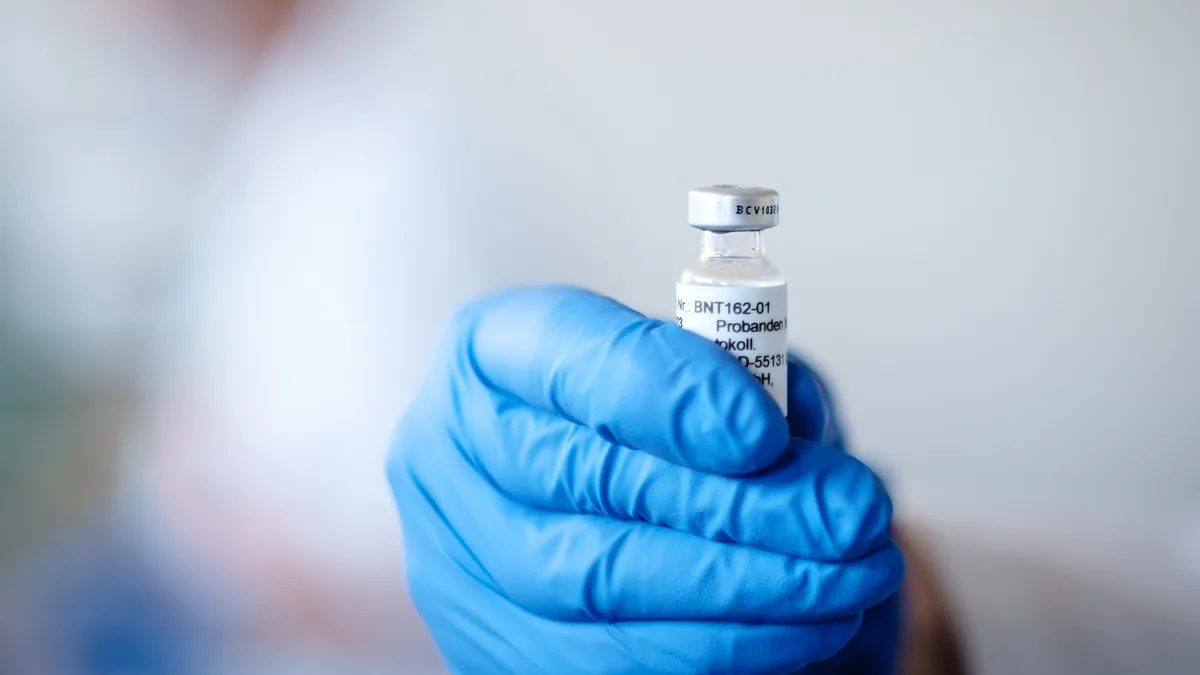Dive Brief:
- Stringent storage and distribution could limit use of Pfizer and BioNTech's coronavirus vaccine candidate more than a rival shot from Moderna if both are authorized for wide use in humans, according to data reviewed by a federal immunization panel. The Pfizer/BioNTech vaccine must be transported and stored at much lower temperatures and, once thawed, only remains stable for 24 hours in a refrigerator.
- Federal officials said those requirements mean the Pfizer/BioNTech vaccine may restrict its use to "centralized sites with adequate equipment and high throughput." Distribution to healthcare facilities for vaccination of their workers is the best allocation of an initial supply, the officials said.
- Guaranteeing that vaccines don't lose their potency will be a challenge for all companies developing shots that have to be refrigerated, including Moderna's, however. Doctor's offices, hospitals and public health departments using Moderna's candidate "will require diligent vaccine management to minimize waste."
Dive Insight:
Proving that vaccines are safe and effective will only be the first part of the battle to bring the coronavirus pandemic under control. The logistics of delivering a vaccine to billions of people worldwide will be a crucial step, particularly early on when the supply is limited.
The Advisory Committee on Immunization Practices (ACIP), a Centers for Disease Control and Prevention panel of outside experts, reviewed information on two of the candidates now in Phase 3 trials that could lead to authorization later this year, from Moderna and BioNTech, the latter of which is partnered with Pfizer.
Both are messenger RNA (mRNA) vaccines, relying on segments of genetic material delivered into cells to help stimulate an immune response. The technology can be used to design and prepare a vaccine for human testing far faster than traditional methods, but it has drawbacks.
mRNA itself is very unstable. And even when encased in a lipid nanoparticle as with Moderna and BioNTech's vaccines, they must be stored and distributed at very cold temperatures to keep them from degrading. Even short-term refrigeration may not keep the vaccines from decaying for very long.
Moderna's shot needs to be stored and transported at -4 degrees Fahrenheit and can be kept in a refrigerator below 46 degrees for up to seven days.
Jacqueline Miller, Moderna's senior vice president for infectious disease development, told ACIP that the company's vaccine, called mRNA-1273, will be distributed in 10-dose vials, and must be used within six hours once a vial is open. Even with that level of flexibility, physicians' offices and pharmacies will need to manage appointments to ensure that few doses are wasted, CDC officials told ACIP.
The BioNTech/Pfizer experimental vaccine, called BNT162b2, however, must be stored and distributed at -94 degrees and once thawed can be kept in a refrigerator at below 46 degrees for up to seven days. These requirements "will make it very difficult for community clinics and local pharmacies to store and administer," the CDC officials told ACIP.
The difference in temperature requirements could be a "fairly meaningful difference commercially," wrote Evercore ISI analyst Umer Raffat in a note to clients. Pfizer is working to extend the stability of its vaccine to seven days as well, however.
Other vaccines in late-stage testing, such as the one AstraZeneca licensed from the University of Oxford, may be able to be kept in a refrigerator and not require freezing, Raffat wrote.
Meanwhile, vaccines that don't need refrigeration could have an edge in parts of the developing world that don't have the necessary electrical infrastructure. Some, like ones that use inactivated viruses to prevent hepatitis A, have been found to be stable after being stored at temperatures of up to 99 degrees for nearly a year.















